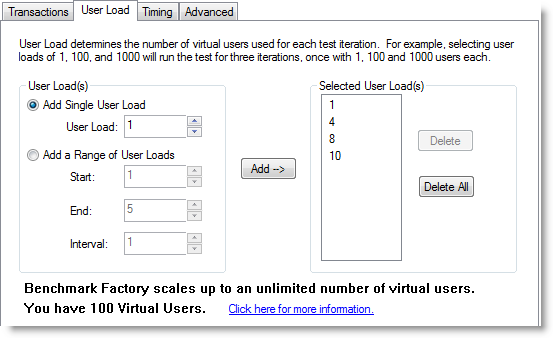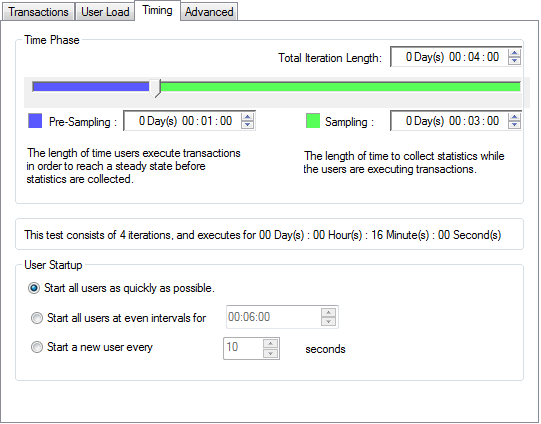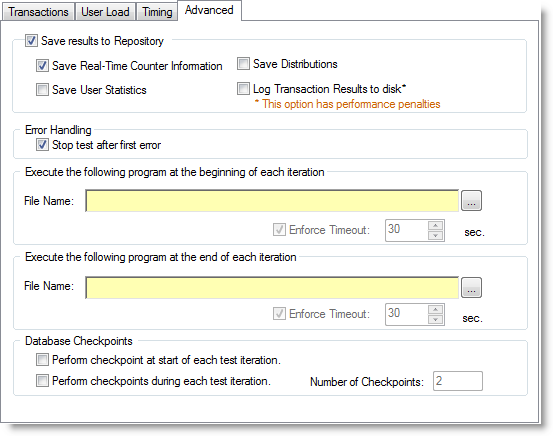Transactions
The Transactions tab of the Edit Job or New Job Wizard allows you to modify the transaction mix, add or delete user scenarios, add or delete transactions, or modify SQL for the selected test in the job.
To modify the transaction mix in a test
- In the Edit Job or New Job Wizard, select a test under Workload in the left pane.
- From the Test Options tab, select the Transactions tab.
-
Use the Transactions tab to modify transactions and/or transaction mix for the selected test. Review the following for additional information:
Click to edit the selected user scenario or transaction. The scenario/transaction opens in a dialog for editing. When editing a scenario or transaction, you can:
- Review the list of SQL in the user scenario.
- Review the benchmark transaction.
- Add additional transactions to the user scenario.
- Delete SQL or transactions from the user scenario.
- Edit a SQL statement or its bind parameter.
- Specify latency for each SQL, each transaction, or for the user scenario. See About Latency for more information.
Move the selected item up or down in the list in the Transaction tab. Transaction Tab Columns
Review the following column descriptions for the Transaction tab.
Weight column—(Transactions) The likelihood a transaction executes by a virtual user. (Not available in Test SQL for Scalability.)
- Transaction weight definition: If a test has two transactions, A and B, with A having the weight of one and B having the weight of six, transaction B will run six times for every time A runs once. The run order is randomly generated for users.
Percentages column—(Transactions) Transaction's weight as a percentage or the total weight. (Not available in Test SQL for Scalability.)
Users—(User scenarios) Displays the number of users tested during replay for this scenario. Double-click to edit.
Executions—(User scenarios) Displays the number of executions for this scenario. Double-click to edit.
Ave. number of statements per commit (Replication test only) Specify the number of statements to include in a commit. Use this option to attempt to simulate typical transactions. Add SQL Transactions Add additional transactions to the test. Select one of the following from the drop-down list and then click
.
- Add SQL Transactions—Add a SQL statement. You can enter SQL or import SQL from a file. See Add SQL Transactions for more information.
- Or click
to launch the BF Script Wizard. See BFScript Wizard for more information.
- Or click
- Add Stored Procedures—Import SQL from a stored procedure.
- Import Benchmark Transactions—Import one or more transactions from one of the standard benchmarks.
Add User Scenario Add a new user scenario to the test. Select one of the following from the drop-down list and then click
.
-
Add User Scenario—Add a new user scenario and then populate it with transactions (from one of the categories listed above).
Note: You can right-click a User Scenario and select Replace Child Latencies. See Replace Child Latencies for more information.
- Add From Session Metafile—Add a user scenario by importing a transaction file.
Replay User Load Add a new scenario to the test by importing a workload from an Oracle trace file, a SQL Server trace table, an ODBC trace file, or a text file. Note: New user scenarios/transactions are added to the top of the list. Use the up and down arrows to rearrange the order of items in the list.
User Load
The User Load tab of the New Job or Edit Job Wizard allows you to specify the number of virtual users for each iteration of a test.
Note: To set default values for User Load, go to Edit | Settings | User Load. If you modify the default settings, the changes will apply to new jobs only, not to existing jobs.

|
Section |
Description |
|---|---|
| User Load |
Add Single User Load—Specify a single user load, then click Add to add it to the selected user loads. Add a Range of User Loads—Specify a range, then click Add to add the range to the selected user loads. |
Timing
Use the Timing tab to specify timing phases associated with a test.

|
Section |
Field/Icon |
Description |
|---|---|---|
|
Time Phase |
Total Iteration Length |
The composite of the Pre-Sampling and Sampling time. |
|
|
Pre-Sampling |
The length of time users execute transactions in order to reach a steady state before statistics are collected. |
|
|
Sampling |
The length of time used to collect statistics while the users are executing transactions. |
|
User Startup |
Start all users as quickly as possible |
Starts all users immediately after a test begins. |
|
|
Start all users at even intervals for |
Sets the amount of time in which to start all users at even intervals. The interval duration is equal to this value divided by the number of users. |
|
|
Start a new user every [n] seconds |
Starts a new user, then waits the entered number of seconds before starting the next user. |
Advanced
You can use the Advanced tab to specify the information to save in the Repository during a test run, to set error handling properties, and to specify database checkpoints for the test.
The repository is a database where all Benchmark Factory information is saved. It contains information about the transactions stored in each benchmark DLL and statistical information from benchmark executions.
To specify Advanced options
- In the New/Edit Job Wizard, select a test under Workload.
-
Select the Test Options tab. Then select the Advanced tab.
-
Specify advanced options. Review the following for additional information:
Section
Description
Save results to Repository
Select to save test information to the Repository. Then select one or more of the following options:
-
Save Real-Time Counter Information—Saves real-time performance monitoring information to the Repository during the test. See Performance Counters Tab for more information.
Note: To specify sampling rate, go to Edit | Settings | Statistics | Real-Time counters.
- Save User Statistics—Saves user-level statistics.
- Save Distribution—Saves transactions per second and response time per user distribution.
-
Log Transaction Results to disk—Logs the transaction results of a job to disk.
Note: Checking this option imposes performance penalties.
Error Handling
Stop test after first error—The test is stopped when an error is reported.
You can specify a default setting in Edit | Settings | Error Handling. See Error Handling Settings.
Execute the following program at the beginning of each iteration
(Available only for benchmark tests and some capture/replay tests.)
Browse to and select the file to execute at the beginning of each iteration.
Note: This field accepts BFScripts.
Enforce Timeout—Select and enter a time to enforce a timeout on the file executing.
Execute the following program at the end of each iteration
(Available only for benchmark tests and some capture/replay tests.)
Browse to and select the file to execute at the end of each iteration.
Note: This field accepts BFScripts.
Enforce Timeout—Select and enter a time to enforce a timeout on the file executing. If the file does not complete in the specified time, it is stopped and the job continues.
Database Checkpoints
Perform checkpoint at start of each test iteration—Initiates a database checkpoint at the beginning of a test iteration.
Perform checkpoints during each iteration—Initiates a database checkpoint during a test iteration.
Number of checkpoints—Specifies the number of checkpoints to initiate.
-



